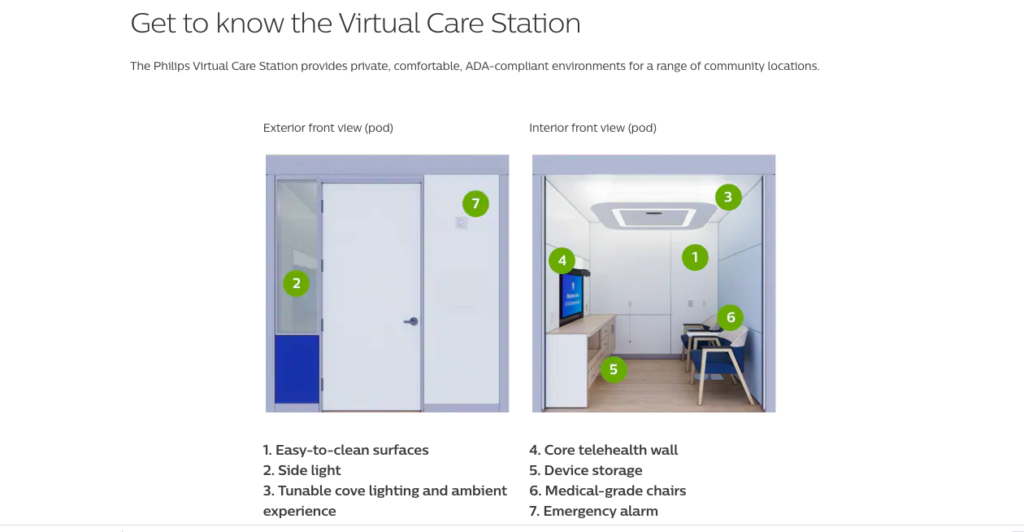Telehealth environment is developed for veterans to give patients access to clinicians in convenient, close-to-home locations
Bengaluru, NFAPost: Royal Philips, a global leader in health technology, announced the launch of Virtual Care Station, a telehealth environment that delivers virtual care services in convenient neighbourhood locations such as retail settings, libraries, town halls and universities.
The pod-based solution connects provider and insurance networks, allowing health providers and patients to have a local, community-based choice for care.
Whether in underserved rural or urban areas, Virtual Care Station helps deliver on the Quadruple Aim by giving patients access to virtual face-to-face care, and is designed to help improve clinical outcomes, lower costs and increase patient and staff satisfaction.
Virtual Care Station is based on Philips technology developed for the ATLAS program (Accessing Telehealth through Local Area Stations), which was created to serve the healthcare needs of US veterans.
Before the Covid-19 pandemic, trends showed some increased interest in the use of telehealth services by both healthcare providers and patients. However, recent policy changes during the pandemic have reduced barriers to telehealth access and have promoted the use of telehealth as a way to deliver acute, chronic, primary and specialty care.
Although at-home telehealth solutions are a convenient option, many patients do not have access to reliable internet access or the digital devices required for telehealth. Moreover, patients may not have the privacy they need for sensitive clinical conversations at home, making the Virtual Care Station a timely option.

Philips created the Virtual Care Station with insights from patients, physicians and caregivers to offer patients the convenience and care of a traditional face-to-face visit. The telehealth station features a camera, lighting and speakers, all specifically designed to provide the clinician and patient the control to produce a high-quality view of the patient and their specific area of concern.
Further, the Virtual Care Station features thoughtful design, including enough room to accommodate the needs of a patient in a wheelchair or with a service dog. Virtual Care Station’s uses can be extended in the future with different capabilities, such as tele-dentistry, and new technologies that further limit touch points such as contactless monitoring. It also offers the potential to supplement visits with remote patient monitoring devices in the home, allowing care teams to track patients’ health between visits.
By expanding our telehealth solution, we hope to give providers an option to engage in population health and support patients closer to home in lower cost settings that can lead to the potential for more follow-up visits, and the opportunity for clinicians to identify at-risk patients earlier and manage health escalations, says Philips north America chief market leader Vitor Rocha.
Today, telehealth options have the potential to help take pressure off of healthcare systems that are overtaxed by COVID-19. According to the CDC, changes in the way that health care is delivered during this pandemic are needed to reduce staff exposure to ill persons, preserve personal protective equipment (PPE) and minimise the impact of patient surges on facilities.
Healthcare systems have had to adjust the way they triage, evaluate and care for patients using methods that do not rely on in-person services [6]. Telehealth services help provide necessary care to patients while minimizing the transmission risk of COVID-19 to healthcare personnel and patients.
By expanding our telehealth solution, Philips North America Chief Market Leader Vitor Rocha said the company hopes to give providers an option to engage in population health and support patients closer to home in lower cost settings that can lead to the potential for more follow-up visits, and the opportunity for clinicians to identify at-risk patients earlier and manage health escalations.
“Not only does it mean the convenience of shorter drive times for patients, it could mean better health outcomes and a safer environment for providers as people benefit from getting the quality care they need in the right place at the right time,” said Philips North America Chief Market Leader Vitor Rocha.





